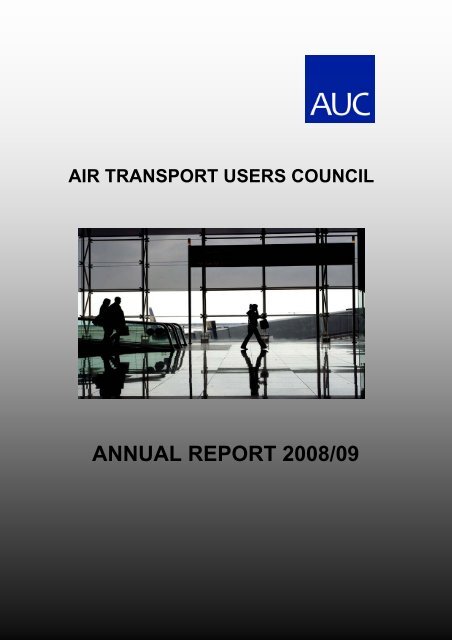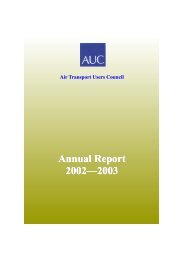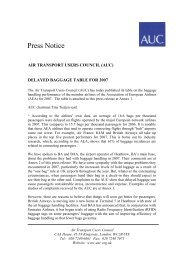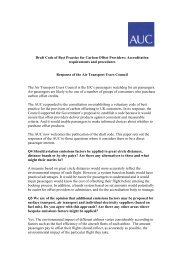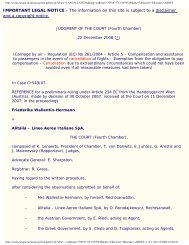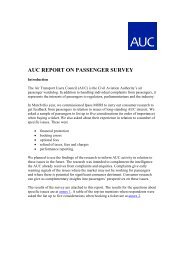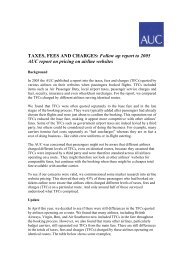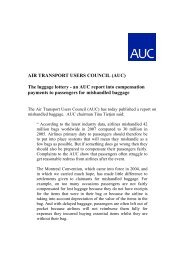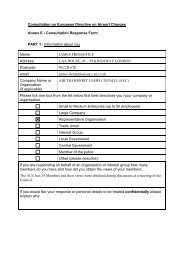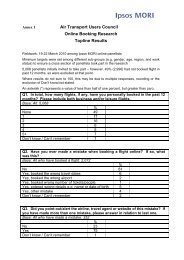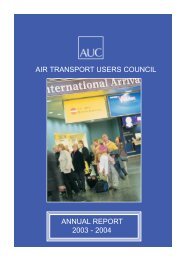Complaints and enquiries - Air Transport Users Council
Complaints and enquiries - Air Transport Users Council
Complaints and enquiries - Air Transport Users Council
Create successful ePaper yourself
Turn your PDF publications into a flip-book with our unique Google optimized e-Paper software.
AIR TRANSPORT USERS COUNCIL<br />
ANNUAL REPORT 2008/09
1<br />
CONTENTS<br />
CHAIRMAN’S INTRODUCTION 2<br />
REVIEW OF THE YEAR 4<br />
<strong>Complaints</strong> <strong>and</strong> <strong>enquiries</strong> 4<br />
Representing passengers 12<br />
External relations 23<br />
THE AUC IN 2008/09 25<br />
Members 25<br />
Secretariat 28<br />
Terms of reference 29<br />
Financial summary 31<br />
GLOSSARY 32
2<br />
CHAIRMAN’S INTRODUCTION<br />
There has been much discussion about the future of air passenger<br />
representation in the UK in the past year. We have set out our own views on<br />
this in our response to the Government’s consultation on the future framework<br />
for the economic regulation of airports in UK, which included proposals for<br />
moving air passenger representation in the UK from the AUC to Passenger<br />
Focus, the body which represents rail <strong>and</strong> bus passengers.<br />
A copy of our detailed response can be found on our website. In short, our<br />
view is that we agree with the Government that the solution to capturing the<br />
consumer interest in regulatory decisions on economic regulation may lie in<br />
updating arrangements for air passenger representation. But where we differ<br />
from the Government, <strong>and</strong> the CAA, is in what is the best way to achieve this.<br />
We believe air passenger interests are best served by a sector-specific<br />
organisation, in particular because of the international <strong>and</strong> competitive<br />
characteristics of the air transport market.<br />
In the meantime, <strong>and</strong> against this backdrop of discussions over our future, our<br />
complaints team has been as busy as ever. We received 12,307 complaints<br />
<strong>and</strong> <strong>enquiries</strong> last year, an increase of 11% on the year before. But<br />
complaints are not just important on an individual basis. The complaints data<br />
is central to the work of an air passenger representation body; in a<br />
competitive market, it gives us an early warning sign of areas where there is<br />
consumer detriment. We can therefore use this “intelligence” to inform our<br />
advocacy work on behalf of all passengers.<br />
Over the past year, we have continued to investigate a wide range of<br />
consumer protection issues which have come to our attention through<br />
complaints. For example, the significant increase in booking tickets online has<br />
led to an increase in written complaints about reservation issues over the past<br />
few years; last year we received 425 written complaints compared to 211 in<br />
2005/06. This increase in complaints prompted us to publish our report on<br />
“Buying tickets online – an AUC report on the pitfalls of booking tickets over<br />
the internet” last May.<br />
However, many of the issues that passengers contact us about have already<br />
been addressed through recent legislation. For example, Regulation<br />
EC261/2004 on compensation <strong>and</strong> assistance in the event of denied<br />
boarding, cancellation <strong>and</strong> delay introduced provisions for redress <strong>and</strong><br />
assistance for delays <strong>and</strong> cancellations. And the Montreal Convention 1999,<br />
which came into force in 2004, increased maximum limits for mish<strong>and</strong>led
3<br />
baggage. Last year, Regulation EC 1008/2008 (“the third package”) came<br />
into force. This includes provisions that should in effect bring in clarity <strong>and</strong><br />
commonsense to airline pricing. In addition, we can use other generic<br />
consumer protection legislation to address areas of consumer detriment in air<br />
transport. For example, we frequently challenge airlines’ conditions of carriage<br />
by reference to the Unfair Terms in Consumer Contracts Regulations.<br />
But we continue to receive large numbers of complaints about alleged<br />
infringements of Regulation EC 261/2004. We also believe that the Montreal<br />
Convention has not brought about the benefits, in terms of settlements of<br />
claims for mish<strong>and</strong>led baggage, that we had hoped for. In addition, we note<br />
that many airlines have yet to fully comply with the provisions of the “third<br />
package”. And a number of airlines continue to include what appear unfair to<br />
us to be terms in their conditions of carriage.<br />
We believe that the priority now is for us to do as much as we can to ensure<br />
that the legislation in place is enforced by the relevant bodies to the benefit of<br />
passengers. In general, that means a greater emphasis on our advocacy work<br />
directed at individual carriers <strong>and</strong> at enforcement bodies, rather than at<br />
legislators or industry trade associations. We therefore see much of our role<br />
as increasingly being to identify issues of detriment as they arise <strong>and</strong> to feed<br />
this intelligence to enforcement bodies.<br />
Last year we continued to work with the CAA, the designated National<br />
Enforcement Bodies in EU Member States, <strong>and</strong> the European Commission on<br />
enforcement of Regulation EC261/2004. And we presented them with<br />
evidence of instances from our complaints where we considered that airlines<br />
had not complied with the rules. We also published a report on mish<strong>and</strong>led<br />
baggage settlements under the Montreal Convention. “The luggage lottery –<br />
an AUC report into compensation payments to passengers for mish<strong>and</strong>led<br />
baggage” concluded that the Convention had not brought about the benefits<br />
to passengers in terms of settlements for mish<strong>and</strong>led baggage that we had<br />
hoped for when it came into force in 2005. This report has since prompted the<br />
European Commission to consider an EU wide investigation of airline<br />
mish<strong>and</strong>led baggage settlements.<br />
So it has again been another packed year for the <strong>Council</strong>. I would like to thank<br />
my fellow Members of the <strong>Council</strong>, <strong>and</strong> also the executive team, for their<br />
support they have given me over the year. Their expertise <strong>and</strong> hard work has<br />
been invaluable to me in what has been a challenging, but ultimately<br />
productive, year for the AUC.<br />
Tina Tietjen
4<br />
REVIEW OF THE YEAR<br />
<strong>Complaints</strong> <strong>and</strong> <strong>enquiries</strong><br />
In 2008/09, the AUC h<strong>and</strong>led 12,307<br />
complaints <strong>and</strong> <strong>enquiries</strong> compared to<br />
11,077 the year before. Of these, 5953<br />
were in writing <strong>and</strong> 6354 were by<br />
telephone.<br />
We accept that the number of<br />
passengers who complain to us is tiny<br />
compared to overall passenger numbers.<br />
But we think the complaints we receive<br />
give an indication of the complaints<br />
received by airlines’ customer relations<br />
teams. And they often give us an inside<br />
track into the policy of an airline towards a<br />
particular issue.<br />
Details of written complaints <strong>and</strong><br />
telephone <strong>enquiries</strong> to the AUC are set<br />
out in the tables overleaf.<br />
A passenger had two watches<br />
stolen from his luggage on a<br />
trip back from the US. He<br />
claimed for the cost of the<br />
watches from the airline,<br />
enclosing copies of the receipts.<br />
However, the airline said that<br />
under its terms <strong>and</strong> conditions it<br />
was not liable for valuable<br />
items <strong>and</strong> referred him to his<br />
travel insurance. In the<br />
meantime the airline lost the<br />
receipts for the watches because<br />
of an “administrative error”, so<br />
the passenger could not claim<br />
from his insurers. The<br />
passenger wrote to us <strong>and</strong> we<br />
managed to persuade the airline<br />
to compensate the passenger for<br />
the cost of the lost watches.<br />
In addition, we had 113,000 hits on the<br />
advice pages on our website, compared<br />
to 160,000 the year before. We cannot be<br />
sure of the reason for such a decrease but we suspect it may be a result of an<br />
increasing number of alternative websites available that provide advice on air<br />
travel, many of which base their information on the advice pages on the AUC<br />
website. We are not concerned by the fall in the number of hits; so long as the<br />
information is getting out to passengers <strong>and</strong> it is correct <strong>and</strong> up to date, it<br />
does not matter where it comes from.
5<br />
Written complaints in 2008/09<br />
Type of complaint<br />
Number of complaints<br />
2008/09 2007/08<br />
Cancellations 2085 1982<br />
Delays 795 875<br />
Mish<strong>and</strong>led baggage 539 624<br />
Reservation issues 415 318<br />
Denied boarding 281 300<br />
Ticketing / refund issues 230 274<br />
Baggage allowance 160 117<br />
Diverted flight 150 104<br />
Missed connections 146 125<br />
Schedule changes 144 99<br />
In-flight services 133 121<br />
Missed departure 132 -<br />
Seating 102 105<br />
Taxes, fees <strong>and</strong> charges 93 32<br />
Special needs 64 56<br />
Documents 58 42<br />
Ground services 53 41<br />
Check-in problems 52 68<br />
Fares 39 57<br />
Security 37 51<br />
Other 245 191<br />
Total 5953 5582<br />
Missed departure was not categorised in 2007/08.
6<br />
Telephone <strong>enquiries</strong> in 2008/09<br />
Type of enquiry<br />
Number of <strong>enquiries</strong><br />
2008/09 2007/08<br />
Cancellations 1685 1545<br />
Delays 734 691<br />
Mish<strong>and</strong>led baggage 681 756<br />
Reservation issues 610 410<br />
Ticketing / refund issues 391 395<br />
Denied boarding 299 257<br />
Schedule changes 238 147<br />
<strong>Air</strong>line failure 231 98<br />
Taxes, fees <strong>and</strong> charges 158 70<br />
Baggage allowance 132 91<br />
Missed connections 129 107<br />
In-flight services 107 92<br />
Diverted flight 105 90<br />
Special needs 77 63<br />
Missed departure 69 -<br />
Documents 68 65<br />
Fares 61 94<br />
Seating 54 98<br />
Ground services 46 69<br />
Check-in problems 46 59<br />
Other 433 298<br />
Total 6354 5495<br />
Missed departure was not categorised in 2007/08.
7<br />
<strong>Complaints</strong> under Regulation EC 261/2004 on compensation <strong>and</strong> assistance<br />
for denied boarding, cancellation <strong>and</strong> delays<br />
Under Regulation EC 261/2004, the AUC is designated as the complaints<br />
h<strong>and</strong>ling body for passengers departing from UK airports, whilst the CAA is<br />
the designated enforcement body.<br />
We received 2919 written complaints that could be categorised as coming<br />
under Regulation EC 261/2004, compared to 2928 the year before. A<br />
breakdown of the number of complaints by type is in the table below.<br />
Type of complaint 2008/09 2007/08<br />
Cancellations 1968 1896<br />
Delays 681 790<br />
Denied boarding 252 242<br />
Downgrading 18 (not categorised)<br />
Total 2919 2928<br />
As with 2007/08, written complaints under the Regulation accounted for about<br />
half of the total complaints we received last year. However, the number of<br />
complaints under the Regulation decreased very slightly (in comparison to an<br />
11% increase in overall complaints).<br />
Delays<br />
We are pleased to report that complaints about delays decreased for the third<br />
year running. Last year we received 681 complaints compared to 790 in<br />
2007/08, <strong>and</strong> 1969 in 2005/6, the first full year after the Regulation came into<br />
force. We like to think that this is a sign that passengers are increasingly<br />
getting what they should be entitled to under the Regulation following a delay.<br />
However, complaints to us show that a number of airlines still continue to<br />
sometimes flout the rules (whether intentionally or not) when a flight is<br />
delayed.<br />
Cancellations<br />
<strong>Complaints</strong> about cancellations increased slightly in 2008/09 compared to<br />
2007/08. However, we are making headway in getting redress for passengers<br />
in terms of compensation. This is something which has often been difficult to<br />
achieve because under Regulation EC 261/2004 airlines do not have to pay<br />
compensation when a flight is cancelled under “extraordinary circumstances”,<br />
which airlines claim tends to be on<br />
most occasions. Last year we<br />
managed to get compensation for<br />
128 complainants who contacted<br />
us compared to 60 the year before.<br />
We had particular success in<br />
persuading one airline to
8<br />
compensate a number of passengers for cancellations caused by “crew<br />
shortages” – we argued that this was foreseeable (<strong>and</strong> therefore not an<br />
“extraordinary” circumstance) <strong>and</strong> could be prevented by rostering extra<br />
backup staff to cover for any shortages.<br />
Our success with these types of complaints <strong>and</strong> the recent European Court of<br />
Justice ruling on the “Wallentin” case (see box below) gives us renewed<br />
optimism that passengers will be in a better position in the future to pursue<br />
their right to compensation when their flight is cancelled.<br />
Summary of European Court of Justice Judgement C-549/07- Wallentin – Hermann<br />
22 December 2008<br />
Background<br />
Mrs Wallentin-Hermann’s flight from Vienna to Brindlisi on Alitalia was cancelled as a<br />
result of an engine defect which had been discovered the day before during a check.<br />
Following the airline’s refusal to pay her compensation, Mrs Wallentin-Hermann went to<br />
court in Austria. The Commercial Court, Vienna, made a reference to the Court of Justice<br />
of the European Communities about whether the technical problems which led to the<br />
cancellation of the flight were covered by ‘extraordinary circumstances’ under Regulation<br />
(EC) No 261/2004 <strong>and</strong> therefore would exempt Alitalia from the obligation to pay<br />
compensation.<br />
Judgement<br />
The Court of Justice found that “in the light of the specific conditions in which air travel<br />
takes place <strong>and</strong> the degree of technological sophistication of aircraft, airlines are<br />
confronted as a matter of course in the exercise of their activity with various technical<br />
problems to which the operation of those aircraft inevitably gives rise. The resolution of a<br />
technical problem caused by failure to maintain an aircraft must therefore be regarded as<br />
inherent in the normal exercise of an air carrier’s activity. Consequently, technical<br />
problems which come to light during maintenance of aircraft or on account of failure to<br />
carry out such maintenance do not constitute, in themselves, ‘extraordinary<br />
circumstances’.”<br />
However, it did not rule out altogether that technical problems could be considered<br />
“extraordinary circumstances”. It suggested that problems that stemmed from events<br />
“which are not inherent in the normal exercise of the activity of the air carrier concerned<br />
<strong>and</strong> are beyond its actual control” might be considered “exceptional circumstances”. For<br />
example, if a fleet of the aircraft were affected by a hidden manufacturing defect which<br />
impinged on flight safety.<br />
A passenger had a reservation for a flight from the Isle of Man to Birmingham.<br />
Unfortunately her flight was cancelled due to technical difficulties. The airline<br />
subsequently refused her claim for compensation. We took up her case with the<br />
airline <strong>and</strong> argued that, in light of the Wallentin ruling, the passenger was due<br />
£250 in compensation under Regulation EC261/2004. The airline subsequently<br />
paid up.
9<br />
Other issues<br />
Reservation issues<br />
Last year we received 415 written complaints about reservation issues,<br />
compared to 318 the previous year. The complaints covered a number of<br />
problems concerning making or changing a reservation. This included<br />
passengers being charged twice for a booking, incorrect names or dates<br />
being entered into the booking, <strong>and</strong> general confusion for consumers about<br />
the fees airlines charged to change reservations.<br />
We had hoped that we would have seen a decrease in complaints about<br />
reservation issues following the publication of our report on buying tickets<br />
online in May (see page 13). But instead complaints have increased<br />
significantly. This is<br />
disappointing. But maybe we<br />
shouldn’t be surprised; the<br />
increasing number of bookings<br />
(<strong>and</strong> changes to reservations)<br />
made online, combined with<br />
continual tinkering by airlines of<br />
their booking systems are going<br />
to create problems sometimes.<br />
<strong>Air</strong>line failure<br />
The financial failure of a number of airlines last year accounted for a<br />
significant increase in telephone <strong>enquiries</strong> about this issue. Last year we<br />
received 231 calls about airline failure compared to 98 the year before. In<br />
addition, there were 5512 hits on the advice page on financial protection on<br />
the AUC website compared to 2155 the year before. There were 1242 hits in<br />
April alone, following the failure of Oasis Hong Kong <strong>Air</strong>lines in that month.<br />
However, we only received 27 written complaints about this issue. This is<br />
probably because there is little we can do for passengers who find themselves<br />
stuck abroad or out of pocket<br />
following an airline going bust,<br />
apart from offer advice over the<br />
phone or through our website.<br />
Unless passengers are covered by<br />
their credit card or travel insurance<br />
they are unlikely to get their<br />
money back even with our help<br />
(see page 16).
10<br />
Schedule changes<br />
Last year we received a total of 382 complaints <strong>and</strong> <strong>enquiries</strong> about schedule<br />
changes compared to 246 the year before. <strong>Complaints</strong> to the AUC show that<br />
schedule changes can have a considerable impact on passengers’ trips. In<br />
some cases, they can undermine the whole reason for the trip in the first<br />
place. For example, a passenger might miss a business meeting or a family<br />
celebration. It can also leave them out of pocket if accommodation or<br />
transfers have been prepaid.<br />
A passenger arrived at Prestwick for a flight<br />
to Girona only to find that the flight had<br />
departed five hours earlier. The airline staff<br />
at the airport said that he should have been<br />
advised of the schedule change by email.<br />
However, the passenger had received no<br />
notification. He had to buy a new ticket for<br />
£166 for the next available flight which was<br />
the next day. And it meant that he could not<br />
use the hotel in Girona which he had already<br />
paid for. He wrote to the airline but all they<br />
would offer was refund of his original flight<br />
of £80. He therefore wrote to us. After we<br />
had taken the complaint up with the airline,<br />
he received a refund of £166 for cost of the<br />
replacement ticket <strong>and</strong> £50 for the hotel<br />
reservation.<br />
Many of the complaints to us<br />
are from passengers who have<br />
not been offered the option of a<br />
refund following a “significant”<br />
schedule change (see page 12<br />
for discussion on the term<br />
“significant”). Another common<br />
complaint is that passengers<br />
have not been advised of the<br />
change <strong>and</strong> have therefore<br />
missed their flight as a result.<br />
The increase in complaints<br />
prompted us to look closer at<br />
this issue last year (see page<br />
12).<br />
Missed departure<br />
Last year we introduced a new category of complaint – missed departure.<br />
This was for complaints we received from passengers who had missed their<br />
flight because they had arrived late at check-in or at the gate <strong>and</strong> had to buy a<br />
new ticket or were out of pocket for the flight they had missed. It is difficult to<br />
compare the numbers from last year with previous years because we<br />
categorised such complaints differently – for example, under ground services<br />
or security (that is, the purported reason for missed departure). But we<br />
introduced this new category because we considered it to be a significant<br />
issue in itself.<br />
<strong>Air</strong>lines’ conditions of carriage generally<br />
state that if a passenger arrives late for<br />
check-in or at the gate then the airline<br />
reserves the right to cancel the<br />
reservation with no refund. This is even<br />
if it is not the fault of the passenger – for<br />
example, if they had got stuck in a<br />
queue at security or the flight monitor<br />
was showing the wrong gate.
11<br />
We are pleased that at least one airline offers a “rescue fee” which<br />
passengers can pay in order to be rebooked onto the next available flight. We<br />
would like to see other airlines adopt a similar policy. However, we<br />
underst<strong>and</strong> why they might not wish to do so; it may let passengers get<br />
around restrictions put on tickets <strong>and</strong> undermine airline pricing structures.<br />
But we hope that such concerns could be overcome; possibly by setting a<br />
“rescue fee” at an amount that would not encourage passengers to use it to<br />
get round ticket restrictions. We plan to keep an eye on this issue. But it may<br />
be that airlines’ increasing use of checking-in online <strong>and</strong> at airport kiosks<br />
instead of check-in desks will cut out many of the delays that cause<br />
passengers to miss flights.
12<br />
Representing passengers<br />
Consumer protection issues<br />
This section looks at issues where the AUC has carried out proactive<br />
advocacy work on behalf of consumers. Much of our work on consumer<br />
protection issues is generated from complaints.<br />
Schedule changes<br />
Last autumn we carried out an online<br />
sweep of the conditions of carriage<br />
of a sample of airlines to find out if<br />
their condition on schedule changes<br />
complied with the Unfair Terms in<br />
Consumer Contracts Regulations<br />
(UTCCRs) (see box). The results of<br />
our sweep shows that policies on<br />
schedule changes vary between<br />
different carriers (see table on page<br />
13).<br />
Most carriers that belong to the<br />
International <strong>Air</strong> <strong>Transport</strong><br />
Association (IATA) offer passengers<br />
a refund for a significant change.<br />
Following a 1999 complaint from the<br />
AUC to the Office of Fair Trading<br />
(OFT) about airlines’ conditions of<br />
carriage, the OFT forced IATA to<br />
amend its Recommended Practice 1724<br />
(RP1724) on airlines’ Conditions of<br />
Carriage to bring it into line with the<br />
Unfair Terms in Consumer Contracts<br />
Regulations. One of the amendments<br />
was to give passengers the option of<br />
choosing a refund if the schedule<br />
change was “significant”. This<br />
amendment has helped many<br />
passengers get a refund following a<br />
schedule change.<br />
One airline even offers refunds following all schedule changes. However, a<br />
number of airlines do not offer passengers the option of a refund of their<br />
tickets, or only do so under strict criteria. The clauses on schedule changes in<br />
these airlines’ conditions could therefore be considered unfair under the<br />
UTCCRs.<br />
We are pleased to say that as a<br />
result of our discussions with two<br />
airlines following our sweep, one<br />
airline has changed its condition<br />
on schedule changes so that<br />
passengers can now get a refund<br />
following a “significant” schedule<br />
change. The other carrier has<br />
made a commitment to do so. But<br />
other airlines continue to not offer<br />
refunds. We therefore plan more<br />
work on this issue this year.
13<br />
Clauses on schedule changes in the conditions of carriage of selected airlines<br />
EasyJet<br />
Ryanair<br />
British <strong>Air</strong>ways<br />
BMI<br />
Flybe<br />
Jet2<br />
<strong>Air</strong>line Policy (as of August 2008)<br />
Fly Globespan<br />
Aer Lingus<br />
Thomsonfly<br />
Monarch<br />
Bmibaby<br />
Virgin<br />
Continental <strong>Air</strong>lines<br />
KLM<br />
Emirates<br />
<strong>Air</strong> Southwest<br />
Eastern <strong>Air</strong>ways<br />
<strong>Air</strong> France<br />
Online booking errors<br />
No refund<br />
Refund if change is more than three hours<br />
Refund if change is significant (RP1724)<br />
Refund if fail to operate “reasonably according to<br />
schedule”<br />
Refund if change is significant (RP1724)<br />
RP1724 but only refund return fare if return is within<br />
48 hours of outbound<br />
No refund (except for general refund policies)<br />
Refund if change is more than two hours<br />
Refund if change is significant (RP1724)<br />
No refund<br />
Refund if change is significant (RP1724)<br />
Refund if change is significant (RP1724)<br />
Refund but not at passenger option<br />
No refund<br />
Refund for all schedule changes<br />
Refund if change is significant (RP1724)<br />
Refund if change is significant (RP1724)<br />
“If change is not convenient for passenger <strong>and</strong> is not in<br />
a position to offer a more suitable reservation, the<br />
passenger may benefit from a refund”<br />
Taken from AUC research, October 2008<br />
In June, we published a report on the potential pitfalls to passengers when<br />
booking tickets online. We published the report because we were becoming<br />
increasingly disappointed by the way that some airlines h<strong>and</strong>led complaints<br />
where passengers had encountered problems booking tickets on the internet.<br />
We felt that the risk of something going wrong was being loaded too much<br />
onto passengers. Too many times they were left out of pocket following<br />
problems with bookings.<br />
We accepted that an error would sometimes be the fault of the person making<br />
the booking <strong>and</strong> the airline, under its ticket conditions, could then insist that<br />
they buy a new ticket. But we wanted airlines not to penalise passengers<br />
unduly for innocent mistakes (or seek to profit from the errors). In a number of<br />
the complaints we received, the airline had not lost out financially <strong>and</strong> the<br />
passenger had not gained any advantage (for example, if an error had caused<br />
a passenger to have more than one booking for a flight, the person could not<br />
use this ticket twice).
14<br />
Besides, we suggested that it was often difficult<br />
to tell where the fault lay. Many of the problems<br />
where it appeared that there had been an error<br />
could have been a result of a glitch somewhere<br />
in the airline’s reservation system. Passengers<br />
might therefore have been penalised when the<br />
error was not their fault.<br />
Our report aimed to both encourage<br />
passengers to notify an airline of a problem as<br />
soon as they could (by following instructions on<br />
the airline’s website if available) <strong>and</strong> to<br />
persuade airlines to change their policies<br />
towards passengers who encountered<br />
problems when booking on the internet. We<br />
sent a copy of the report, with an<br />
accompanying letter, to the chief executives of eight major UK carriers asking<br />
them to review their policies. We asked them to consider putting into place<br />
policies that gave more consideration to passengers who had difficulties<br />
booking online. We recommended they introduce a “24-hour rule” (see below)<br />
whereby passengers could cancel bookings within 24 hours of making the<br />
reservation.<br />
Ale<br />
We underst<strong>and</strong> that the<br />
A 24-hour rule<br />
We underst<strong>and</strong> that the majority of airline tickets are non-refundable<br />
<strong>and</strong> accept that airlines should be able to charge to rectify booking<br />
errors under some circumstances; for example, if the error only comes<br />
to light very close to departure. That is why we believe that an airline<br />
rule giving passengers the chance to make changes or claim a refund<br />
(even if subject to a small administration fee) within 24 hours of making<br />
a booking would provide passengers with at least some protection<br />
against being out of pocket. At least one airline already has such a term<br />
in its conditions.<br />
We received a positive response from most airlines – some airlines even<br />
introduced a 24-hour rule into their terms <strong>and</strong> conditions as a result of our<br />
report. Others took on board our views <strong>and</strong> said they would put in place<br />
internal policies along the lines of a 24-hour rule. They would also be<br />
generally more sympathetic to their customers. We will be keeping an eye on<br />
this issue <strong>and</strong> plan more work on this issue in the year to come. But we hope<br />
that such problems will diminish as passengers become more accustomed to<br />
internet shopping <strong>and</strong> as the online booking systems become more reliable.
15<br />
Settlements to passengers for mish<strong>and</strong>led baggage<br />
In March, we published a report on how<br />
airlines had h<strong>and</strong>led claims for compensation<br />
from passengers for mish<strong>and</strong>led baggage<br />
since the Montreal Convention came into force<br />
in 2004. The report was based on the<br />
complaints we had received in that period. We<br />
concluded that the implementation of the<br />
Montreal Convention had not brought about<br />
the benefits, in terms of settlements for<br />
mish<strong>and</strong>led baggage, that we had hoped for.<br />
We suggested that the risks associated with a<br />
bag being delayed, damaged or lost were still<br />
loaded too much on the passenger.<br />
We found that airlines tended to act in a way<br />
similar to insurance companies when settling<br />
claims for lost <strong>and</strong> damaged baggage. They generally expected passengers<br />
to provide receipts as proof of ownership for lost baggage, something which<br />
was not always practical. We thought that this was inappropriate; airlines,<br />
unlike insurance companies, were responsible for the bag being mish<strong>and</strong>led.<br />
And with delayed bags, we found that airlines often limited the amount a<br />
passenger could spend buying replacement items. We understood that<br />
airlines might want to make sure passengers spent reasonably but we<br />
considered that they should offer guidance on this <strong>and</strong> not arbitrary limits.<br />
We are pleased to say that our report had an immediate effect. On the 17 th<br />
March, Vice-President Tajani, the EU’s Commissioner for <strong>Transport</strong> noticed<br />
our report <strong>and</strong> published a press release stating that he would<br />
“take immediate measures on passenger rights starting with an investigation<br />
on the scale of the phenomenon. The European Commission's Directorate-<br />
General for <strong>Transport</strong> <strong>and</strong> Energy will ask today for information from the<br />
<strong>Air</strong>ports International <strong>Council</strong>, <strong>and</strong> the Association of European <strong>Air</strong>lines <strong>and</strong><br />
other parties concerned. The Commission will also contact AUC that was the<br />
first to reveal this information”.<br />
He said that the European Commission would then evaluate “the effective<br />
application of Regulation 889/2002 (Montreal Convention) on luggage loss<br />
<strong>and</strong> damage” <strong>and</strong> assess whether any improvements to the Regulation were<br />
required.<br />
The Commission has since contacted the relevant bodies in Member States,<br />
including the AUC, to request information on airline settlements under the<br />
Montreal Convention. We have sent to them a copy of our report <strong>and</strong> details<br />
of the complaints we have received. We look forward to helping the<br />
Commission further with its investigations.
16<br />
Financial protection<br />
Last year the failures of Oasis Hong Kong <strong>Air</strong>lines, Zoom <strong>and</strong> XL, amongst<br />
other airlines, left thous<strong>and</strong>s of British passengers str<strong>and</strong>ed abroad or, for<br />
those who were yet to travel, out of pocket. This is because there is no<br />
financial protection against the failure of schedule airlines in the UK as there<br />
is for tour operators (under the ATOL scheme).<br />
When an airline fails, passengers can get their airfare refunded from their<br />
credit card company under the Consumer Credit Act if they made their<br />
booking by credit card. But purchases made on credit cards must be above<br />
£100 <strong>and</strong> be made directly with the supplier. And many passengers do not<br />
pay for flight tickets with a credit card; they may not own one or they may wish<br />
to avoid credit card charges. Alternatively passengers can get their money<br />
back through their travel insurance. But few travel insurance policies offer<br />
cover against the failure of scheduled airlines <strong>and</strong>, of those that do, some<br />
have exclusions that appear to potentially dilute the cover.<br />
For a number of years, we have called for government to introduce a financial<br />
protection scheme for the failure of scheduled airlines similar to the ATOL<br />
scheme for tour operators. In 2005, we supported the CAA’s detailed proposal<br />
for a financial protection scheme for scheduled airlines. But the Government<br />
declined to take forward the CAA’s proposals.<br />
In October, our chairman wrote to Geoff Hoon, the then Secretary of State for<br />
<strong>Transport</strong>, about this issue. In her letter she suggested that the current<br />
economic climate <strong>and</strong> the increasingly competitive nature of the industry<br />
raised the spectre of a greater likelihood of airline failure. This, together with a<br />
background of consumers’ general lack of underst<strong>and</strong>ing of financial<br />
protection, had made air passengers increasingly vulnerable to the impact of<br />
an airline’s failure. Further, we suggested that this was clearly demonstrated<br />
by the numbers of passengers seemingly left out of pocket or str<strong>and</strong>ed abroad<br />
following recent failures.<br />
The AUC’s previous position in respect of scheduled airline failure has been<br />
that protection should be via a flat fee levy on all passengers to be paid into a<br />
common fund. This levy should cover passengers for reimbursement of<br />
monies <strong>and</strong> for those already abroad, completion of holiday <strong>and</strong> return home.<br />
We continue to hold this view <strong>and</strong> urge that detailed consideration be given to<br />
extending financial protection for air passengers, to include the failure of<br />
scheduled airlines.<br />
Despite the current economic climate <strong>and</strong> pressure from us <strong>and</strong> other industry<br />
stakeholders, the Government shows no sign of introducing a scheme.<br />
Perhaps our best hope may be to look to Europe. Last year, the European<br />
Commission commissioned a study to consider the impact on EU consumers<br />
of airline bankruptcies based on an analysis of the causes <strong>and</strong> situations<br />
surrounding aviation bankruptcies in the EU since 2000.
17<br />
Supplementary charges<br />
One of the most noticeable trends to have emerged in the airline industry in<br />
the last few years has been the increase in the number of supplementary<br />
charges for services that would previously have been paid for as part of the<br />
ticket. In the last year, many airlines have introduced an array of new charges<br />
<strong>and</strong> increased existing ones.<br />
We said in our annual report last year that we did not automatically consider<br />
such charges as bad news for passengers provided the charges were optional<br />
<strong>and</strong> for specific services. For passengers who did not need these services, it<br />
might mean the price they pay for their flight was lower as a result. We<br />
accepted it was an evolution of the market in response to the advent of<br />
no-frills air travel. And we concluded that as long as the charges remained<br />
optional then passengers should not be concerned at this development.<br />
We still hold this view. But complaints to the AUC show that not all<br />
passengers share it. Written complaints about taxes, fees <strong>and</strong> charges<br />
increased by nearly three times last year, mainly due to an increase in<br />
complaints about supplementary charges. Most complaints tended to be<br />
about the level of the charge rather than the principle; for example, many<br />
passengers considered that the credit <strong>and</strong> debit card charges were<br />
disproportionate to the cost to the airline of processing their booking. And they<br />
were concerned by how much card charges had increased in recent years<br />
(we compared the card charges of five airlines in October to four years<br />
previously - see table below). Complainants also felt other charges were often<br />
not good value, particularly reservation change fees <strong>and</strong> baggage fees.<br />
<strong>Air</strong>line<br />
February 2004 October 2008<br />
Credit debit Credit Debit<br />
British None None £4 per ticket None<br />
<strong>Air</strong>ways<br />
BMI £4 per person None £4 per person None<br />
EasyJet £4 per booking None 2.5% of<br />
booking<br />
(minimum<br />
£4.95)<br />
£1.95 per<br />
booking<br />
Flybe<br />
Ryanair<br />
£1.75 per<br />
person per<br />
sector<br />
£1.75 per<br />
person per<br />
sector<br />
£0.40 per<br />
person per<br />
sector<br />
£0.40 per<br />
person per<br />
sector<br />
£3.50 per<br />
person per<br />
sector<br />
£4 per person<br />
per sector<br />
£1.50 per<br />
person per<br />
sector<br />
£4 per person<br />
per sector<br />
Taken from AUC research, October2008<br />
We understood these concerns. But we pointed out to these passengers that<br />
the charges were optional. Some airlines did not charge for using credit or<br />
debit cards <strong>and</strong> even those that did allowed passengers to use a prepaid card<br />
for free. In addition, many airlines continued to include services, such as for<br />
baggage h<strong>and</strong>ling <strong>and</strong> seat allocation, as part of the fare. And being allowed
18<br />
to change the date or the name of a reservation for a fee was better than not<br />
being able to make a change at all <strong>and</strong> having to buy a new ticket, which was<br />
previously the case with most airlines.<br />
Consultations <strong>and</strong> Inquiries<br />
In addition to our primarily proactive advocacy work generated from<br />
complaints, we represent the interest of passengers through responding to<br />
consultations <strong>and</strong> inquiries. This section summarises a selection of the<br />
consultations. A full list is on page 22.<br />
Aviation Duty<br />
In April, we responded to the Treasury’s consultation on proposals to<br />
introduce an Aviation Duty to replace <strong>Air</strong> Passenger Duty (APD). The<br />
Government proposed to replace APD with a per plane tax on the grounds<br />
that this would better reflect the environmental impact of individual aircraft.<br />
We said that we had no objection<br />
in principle to environmental levies<br />
or taxes, provided there was a<br />
clear connection between the<br />
charges <strong>and</strong> the mitigation of the<br />
impact of aviation on the<br />
environment. But we had doubts<br />
whether a per-plane tax would<br />
achieve this better than APD.<br />
This was because the burden on<br />
airlines, <strong>and</strong> therefore potentially the amount payable by passengers, would<br />
be dependent on the destination of only the ex UK flight, in contrast to APD<br />
which is dependent on the final destination. Passengers going to long haul<br />
destinations might therefore have been more likely to choose to fly via a<br />
European hub airport instead of on a direct long haul flight from a UK airport.<br />
We suggested that this could potentially reduce the overall amount of tax<br />
collected by the Government.<br />
The Government has since dropped plans to introduce the tax <strong>and</strong> instead<br />
plans to increase APD from November 2009.<br />
<strong>Air</strong>port regulation<br />
Review of the economic regulation of airports in the UK<br />
In October, the Department for <strong>Transport</strong> (DfT) published a consultation on a<br />
review of economic regulation of airports in the UK. In its review, the DfT<br />
invited comments on its initial thinking on the rationale for intervention in the<br />
airport market <strong>and</strong> on a regulatory regime that was fit for purpose over the<br />
long term.
19<br />
The AUC’s principal concern was for the interests of passengers to be taken<br />
fully into account in all regulatory decisions. We believed that that this would<br />
be best achieved by giving the CAA a primary duty to consumers. We<br />
questioned whether airlines would always make decisions in the best interests<br />
of passengers – <strong>and</strong>, by extension, whether they could always be relied upon<br />
to act as proxy for passengers’ interests in discussion of airport charges.<br />
Different airlines would have different incentives in respect of airport<br />
investment decisions such as on timing, scale or quality. And those views may<br />
not always be completely aligned with their passengers’ aspirations. We<br />
suggested therefore that there was, in theory at least, an inherent potential<br />
conflict between shareholder profit aspirations <strong>and</strong> passenger interests in<br />
service quality.<br />
In addition, we suggested that regulation<br />
was only part of the solution. Good<br />
passenger experience at an airport<br />
depended equally on good management<br />
by airport companies <strong>and</strong> on the<br />
Government playing its part in the<br />
provision of surface access infrastructure<br />
<strong>and</strong> adequate resources for border<br />
control.<br />
In March, the DfT published a further,<br />
more detailed, consultation on the review<br />
of economic regulation. We submitted a<br />
response on the 2 nd June, a copy of which<br />
can be found on our website.<br />
Price control proposals for Stansted <strong>Air</strong>port charges for 2009-2014<br />
In December, the CAA published a consultation on its proposals for the<br />
setting of new price controls at Stansted <strong>Air</strong>port for the period 1 April 2009 to<br />
31 March 2014. Our major interest in the consultation concerned the CAA’s<br />
proposals on service quality in response to the Competition Commission’s<br />
(CC)’s finding that BAA had failed in its provision of airport services of<br />
adequate quality.<br />
We agreed with the CAA that the evidence put forward by the CC was<br />
sufficiently compelling for the CAA to propose to introduce a Service Quality<br />
Regime at Stansted similar to the ones already in place at Heathrow <strong>and</strong><br />
Gatwick. We considered that these regimes had provided passengers with a<br />
transparent <strong>and</strong> measurable benefit of price cap regulation.<br />
In March, the CAA published its decision on setting a price cap for Stansted<br />
from 2009-14. It introduced a regime with a set of service performance<br />
st<strong>and</strong>ards <strong>and</strong> rebates under which the airport operator would reimburse<br />
airlines up to seven per cent of airport charges where the airport’s service<br />
performance fell short of the defined st<strong>and</strong>ards. The CAA decided to base
20<br />
two-thirds of the st<strong>and</strong>ards <strong>and</strong> rebates on service performance in passenger<br />
security processing.<br />
CAA proposals for modifications to the Statement of St<strong>and</strong>ards <strong>and</strong> Rebates<br />
to include three additional elements<br />
In March, the CAA published a consultation proposing to introduce three new<br />
elements to the Service Quality Regime at Gatwick <strong>Air</strong>port – transfer search,<br />
staff searches <strong>and</strong> control post.<br />
We welcomed the CAA’s proposal to take into account the smaller number of<br />
transfer passengers at the airport when setting st<strong>and</strong>ards for queue times at<br />
transfer areas. We considered that it was not in the consumer interest for<br />
certain areas of the airport to be over resourced if increases in airport charges<br />
(due to additional staffing) were passed on to passengers by airlines through<br />
increases in airfares. We also welcomed the proposals to provide incentives<br />
to shorten queue times at staff search areas <strong>and</strong> control posts. We suggested<br />
that this could help improve punctuality because delays to staff in getting to<br />
their posts could delay departures.<br />
At the end of March, the CAA<br />
published the responses to the<br />
consultation <strong>and</strong> its decision. All<br />
respondents to the consultation<br />
agreed to the introduction of the new<br />
st<strong>and</strong>ards <strong>and</strong> the scope <strong>and</strong><br />
methods used to measure them. The<br />
CAA has therefore introduced the<br />
three new elements.<br />
HM Revenue <strong>and</strong> Customs / UK Border consultation on a draft code of<br />
practice on customs examination of baggage in the absence of passenger<br />
In July, HM Revenue <strong>and</strong> Customs <strong>and</strong> UK Border consulted on a draft code<br />
of practice on customs examination of baggage in the absence of passenger.<br />
This would set out the circumstances in which customs officers would carry<br />
out targeted checks on baggage in the absence of their owners <strong>and</strong> a<br />
framework of authorisation <strong>and</strong> supervision.<br />
Our main interest in this consultation was in making sure that innocent<br />
passengers received compensation for damage or delay to their baggage<br />
following searches by customs officers. We welcomed the commitment in the<br />
draft Code to compensate passengers. But we had concerns that details of<br />
the damage, as noted by officers, might not be released as evidence in order<br />
to help passengers with claims with airlines. We were also concerned that the<br />
draft Code had no provisions for compensation for bags delayed by the<br />
searches.
21<br />
Home Office / Department for <strong>Transport</strong> consultation on airport policing,<br />
funding <strong>and</strong> security planning<br />
In July, the Home Office <strong>and</strong> Department for <strong>Transport</strong> (DfT) consulted on<br />
their proposals to make airport security planning, <strong>and</strong> the funding <strong>and</strong><br />
activities of police at airports, more transparent <strong>and</strong> strategic in nature. This<br />
was with a view to putting airport policing <strong>and</strong> security planning proposals on<br />
a legislative footing as part of the <strong>Transport</strong> Security Bill.<br />
The consultation was primarily targeted at industry. But passengers have a<br />
direct interest in airport security. We therefore considered that the proposals<br />
should reflect the need for the travelling public to be protected from the range<br />
of security threats. We welcomed the objectives of the proposals to bring<br />
together the conflicting interests of stakeholders to produce a co-ordinated<br />
security regime across all UK airports. This would ensure there was a wideranging<br />
input into <strong>Air</strong>port Security Plans <strong>and</strong> Police Service Agreements at all<br />
airports in the UK.<br />
In September, the DfT published the responses to the consultation <strong>and</strong> its<br />
decision. Other responses to the consultation also highlighted the need for<br />
flexibility in the framework in order to bring together all stakeholders. The DfT<br />
has amended the draft legislation to provide a “more flexible framework which<br />
can be applied to all airports large <strong>and</strong> small”. It has also decided that, in<br />
order to make sure all views are taken into account, it, rather than an<br />
independent expert panel, should “take responsibility for resolving disputes<br />
over the contents or implementation of <strong>Air</strong>port Security Plans <strong>and</strong> Police<br />
Service Agreements”.
22<br />
Consultations <strong>and</strong> Inquiries<br />
Civil Aviation Authority<br />
Consultation on airport regulation; price control review - price control<br />
proposals for Stansted <strong>Air</strong>port<br />
Consultation on Gatwick <strong>Air</strong>port; CAA proposals for modification to the<br />
Statement of St<strong>and</strong>ards <strong>and</strong> Rebates to include three additional elements<br />
Department for <strong>Transport</strong><br />
Consultation on access to air travel for disabled persons <strong>and</strong> persons with<br />
reduced mobility – Code of Practice<br />
Review of economic regulation of airports<br />
HM Treasury<br />
Aviation Duty : A consultation<br />
HM Revenue <strong>and</strong> Customs / UK Border<br />
Consultation on a draft code of practice on customs examination of baggage<br />
in the absence of passenger<br />
Home Office / Department for <strong>Transport</strong><br />
Consultation on airport policing, funding <strong>and</strong> security planning<br />
Department for Communities <strong>and</strong> Local Government<br />
Consultation on the list of statutory consultees for National Policy Statement<br />
<strong>Transport</strong> Select Committee<br />
Inquiry into the future of aviation<br />
(all AUC consultation responses are available on the AUC website –<br />
www.auc.org.uk)<br />
AUC Reports<br />
Buying tickets online – an AUC report on the pitfalls of booking air tickets over<br />
the internet<br />
The luggage lottery – an AUC report into compensation payments to<br />
passengers for mish<strong>and</strong>led baggage
23<br />
External relations<br />
Media<br />
Last year we gave 407 media briefings, compared to 308 the year before,<br />
including participation in 80 TV <strong>and</strong> radio interviews. Most of our media work<br />
is reactive, as befits a small team that does not include a full time press<br />
officer. The increase was partly due to the large number of aviation stories in<br />
the news throughout the year. It was also a result of coverage generated from<br />
our four press releases over the year. We aim to be proactive in getting our<br />
message out to the public through the media. We think that this is important<br />
for many reasons. It helps put issues into the public domain <strong>and</strong> therefore<br />
bring them to the attention of both regulators <strong>and</strong> airlines. And it also helps us<br />
to get advice out to passengers, both in terms of how they can to avoid<br />
potential pitfalls when travelling <strong>and</strong> what to do if something should go wrong.<br />
Committees, working groups <strong>and</strong> coalitions<br />
Aberdeen <strong>Air</strong>port Consultative Committee<br />
<strong>Air</strong> <strong>Transport</strong> Action Group (ATAG)<br />
<strong>Air</strong> Travel Insolvency Protection Advisory Committee (ATIPAC)<br />
Aviation Health Working Group<br />
Consular Stakeholder Panel<br />
Disabled Person <strong>Transport</strong> Advisory Committee (DPTAC) Aviation working<br />
Group<br />
External Advisory Group (implementation of the White paper on the Future of<br />
<strong>Air</strong> <strong>Transport</strong>)<br />
Flying Matters<br />
Heathrow <strong>Air</strong>port Consultative Committee<br />
National Aviation Security Committee (associate member)<br />
National <strong>Air</strong> Traffic Services (NATS) Stakeholder <strong>Council</strong><br />
External visits (full <strong>Council</strong>)<br />
National <strong>Air</strong> Traffic Services Headquarters, Swanwick, Hampshire<br />
<strong>Air</strong>bus Headquarters, Toulouse, France
24<br />
Guest speakers at AUC <strong>Council</strong> meetings<br />
Alex Bristol, General Manager, National <strong>Air</strong> Traffic Services, Swanwick<br />
Janice Fisher, Manager Cabin Safety office, CAA<br />
Kieran Hanks, Economics <strong>and</strong> Regulation Director, BAA<br />
Liz Savage, Managing Director, Monarch Scheduled<br />
AUC lunch<br />
On October 16 th , we welcomed Willie Walsh, Chief Executive of British<br />
<strong>Air</strong>ways, to speak to invited guests from the aviation industry at an AUC<br />
lunch.
25<br />
THE AUC IN 2008/09<br />
Members (as of March 31 st 2009)<br />
Tina Tietjen – Chairman<br />
Tina Tietjen lives in London. She currently holds a number of non-executive<br />
positions in both the public <strong>and</strong> private sectors, <strong>and</strong> also provides consultancy<br />
services on training. She was previously joint managing director of Video Arts<br />
Ltd, an international training business <strong>and</strong> has recently become chair of the<br />
Willow Foundation which provides special days for seriously or terminally ill<br />
people between 16 <strong>and</strong> 40. She has travelled extensively throughout her<br />
career <strong>and</strong> continues to do so on a regular basis.<br />
Lynette Braithwaite<br />
Lynette Braithwaite is from Australia but has been based in the UK for the last<br />
twenty years, although for eight of these she lived in Indonesia, the UAE <strong>and</strong><br />
Russia. She is a qualified solicitor <strong>and</strong> has practised in the legal profession in<br />
various capacities. She is a member of both local <strong>and</strong> school representative<br />
bodies. She travels regularly by air, both long <strong>and</strong> short haul, for leisure<br />
(regularly visiting family spread around the world), <strong>and</strong> for her husb<strong>and</strong>’s<br />
business.<br />
David Brew<br />
David Brew lives in Edinburgh. He is a career civil servant, most recently in a<br />
senior capacity in the Scottish Government, though he is also a past chief<br />
executive of the Institute of Chartered Accountants of Scotl<strong>and</strong>. He has<br />
worked in the UK civil service <strong>and</strong> as a European Commission official. He has<br />
travelled extensively by air, both internationally <strong>and</strong> within the UK, over many<br />
years, for business <strong>and</strong> leisure.<br />
John Charlesworth<br />
John Charlesworth lives in Lincolnshire. He has spent the majority of his<br />
working life visiting <strong>and</strong> living in Africa <strong>and</strong> other parts of the developing world.<br />
He now runs a company looking after vehicle fleet management for the United<br />
Nations <strong>and</strong> aid <strong>and</strong> development organisations’ field projects. Due to the<br />
nature of his work, he travels extensively to remote destinations on a wide<br />
variety of airlines, as often as not in the economy section.<br />
Gillian Dale<br />
Gillian Dale has many years experience of teaching travel <strong>and</strong> tourism<br />
subjects in further education. She is currently an educational consultant <strong>and</strong><br />
works as an advisor with teachers in schools colleges <strong>and</strong> training providers.
26<br />
She has written several text books for travel <strong>and</strong> tourism courses, most of<br />
which have sections on the aviation industry. She flies regularly, particularly in<br />
Europe.<br />
Phillip Dann<br />
Phillip Dann lives in London. He is a solicitor advising in telecommunications<br />
law <strong>and</strong> public international law. He worked at Inmarsat, the sea, air <strong>and</strong> l<strong>and</strong><br />
mobile satellite agency. Later on, he was a partner at Bird & Bird in the City.<br />
In 1993, he had a stroke <strong>and</strong> aphasia, <strong>and</strong> now he is a trustee of Speakability,<br />
the aphasic charity.<br />
Arthur de Frisching<br />
Arthur de Frisching lives in London. Of Swiss background he has worked in<br />
the public sector in both executive <strong>and</strong> non-executive roles. He has travelled<br />
extensively in connection with human rights work <strong>and</strong> now flies mainly for<br />
leisure, including to South Africa where he has family connections.<br />
Nigel Evans<br />
Nigel Evans lives in Sunderl<strong>and</strong> <strong>and</strong> is currently deputy dean at Teesside<br />
Business School, part of Teesside University, having previously worked for<br />
fifteen years at Northumbria University. His writing <strong>and</strong> teaching focuses on<br />
strategic changes in the international travel industry. Prior to joining academia<br />
he had a varied commercial career with a tour operator. He travels regularly<br />
by air both for work <strong>and</strong> leisure.<br />
David Fraser<br />
David Fraser lives in Edinburgh, <strong>and</strong> was a chief executive in the public sector<br />
in Scotl<strong>and</strong>. He is chairman of the Castle Rock Edinvar Housing Association,<br />
Chairman of the Scottish Refugee <strong>Council</strong>, <strong>and</strong> a member of the UK Ethics<br />
Committee of the Department for Work <strong>and</strong> Pensions. He has a particular<br />
interest in how organisations can learn from complaints to improve the quality<br />
of service delivery.<br />
Jeanette Hebbert<br />
Jeannette Hebbert lives in Oxford. For over twenty-one years she was a<br />
headteacher of large comprehensives in London <strong>and</strong> Oxfordshire. She now<br />
works as an educational consultant for the Academies Trust <strong>and</strong> helps to<br />
coordinate the work of Higher Performing Schools. She is a Fellow of the<br />
Royal Society of the Arts <strong>and</strong> is a member of the Court of Oxford Brookes<br />
University. She travels extensively to the USA <strong>and</strong> Europe.<br />
Richard Lambert<br />
Richard Lambert lives in Cambridgeshire <strong>and</strong> is a civil engineer <strong>and</strong> transport
27<br />
planner who, for 20 years, was responsible for all planning <strong>and</strong> development<br />
at Birmingham International <strong>Air</strong>port. He retired in late 2001, but continues to<br />
lecture, write <strong>and</strong> provide consultancy services on transport <strong>and</strong> aviation<br />
matters, <strong>and</strong> continues to travel frequently by air for both business <strong>and</strong><br />
pleasure.<br />
Eric Melrose<br />
Eric Melrose lives in Aberdeen. He had a forty-four year career in local<br />
government, <strong>and</strong> was Director of Planning <strong>and</strong> Environment Services with<br />
Aberdeenshire County <strong>Council</strong> immediately before his retirement. He held a<br />
number of other senior positions, mostly related to Trading St<strong>and</strong>ards, <strong>and</strong> a<br />
number of national appointments with the Trading St<strong>and</strong>ard Institute <strong>and</strong><br />
Lacors. He worked on the development of Consumer Direct in Scotl<strong>and</strong>. He<br />
travels frequently by air for business <strong>and</strong> leisure purposes.<br />
Chris Parker<br />
Chris lives in Buckinghamshire. He has spent the majority of his career in the<br />
travel industry <strong>and</strong> has also worked for BMI, SITA <strong>and</strong> Galileo International.<br />
More recently he has been responsible for purchasing global travel <strong>and</strong><br />
events for Jaguar <strong>and</strong> L<strong>and</strong> Rover. Currently he works as an independent<br />
purchasing consultant. He travels extensively for business <strong>and</strong> pleasure.<br />
Francesca Phang-Lee<br />
Francesca Phang-Lee lives in Oxford. She is a lawyer <strong>and</strong> worked in an<br />
inhouse capacity for a number of years with General Electric (USA) <strong>and</strong> Shell<br />
Asia-Pacific. She travelled in a professional capacity on a regular basis<br />
throughout the Asia-Pacific region <strong>and</strong> to the USA. She continues to work as<br />
a lawyer, but also works in a voluntary capacity with local charities. She still<br />
loves travelling <strong>and</strong> now flies regularly to short haul <strong>and</strong> long haul destinations<br />
for leisure with her young family.<br />
Fiona Raje<br />
Fiona Raje lives in Northumberl<strong>and</strong>. She has worked in academic, research<br />
<strong>and</strong> operational roles in transport <strong>and</strong> has a doctorate from the University of<br />
Oxford. She has written books on transport <strong>and</strong> ethnicity <strong>and</strong> user<br />
experiences of the contemporary transport system. Having grown up in the<br />
Caribbean, she has travelled by air for many years.<br />
Kathryn Talintyre<br />
Kathryn Talintyre lives in Essex <strong>and</strong> spent twelve years pursuing a career in<br />
marketing <strong>and</strong> management consultancy. Following a period of volunteering<br />
at the local Adult Community College, she now teaches Skills for Life<br />
numeracy to adults. She travels regularly by air with her family.
28<br />
Secretariat (as of March 31 st 2009)<br />
Simon Evans - Chief Executive<br />
James Fremantle - Industry Affairs Manager<br />
Frances Walther - Consumer Affairs Manager (part time)<br />
Tina Dunkin - Consumer Affairs Supervisor (part time)<br />
Taruna Mistry - Consumer Affairs Supervisor (Operations)<br />
Paola Accardo - Consumer Affairs Officer<br />
Adrian Ghilotti - Consumer Affairs Officer<br />
Andrew Thompson - Consumer Affairs Officer<br />
Lucy Wickens - Consumer Affairs Officer<br />
Monica Bonello - Secretary / Administrator<br />
Alicia Mathurin-Greene - Administrative Assistant<br />
Nick Worrell - Administrative Assistant
29<br />
Terms of Reference<br />
Purpose<br />
The <strong>Air</strong> <strong>Transport</strong> <strong>Users</strong> <strong>Council</strong> (AUC) will complement <strong>and</strong> assist the Civil<br />
Aviation Authority (CAA) in its duties to further the reasonable interests of<br />
users of air transport services.<br />
Functions<br />
• To investigate complaints against the suppliers of air transport services<br />
where the person or body aggrieved has not been able to obtain<br />
satisfaction from the supplier concerned <strong>and</strong> to seek a resolution where<br />
appropriate.<br />
• To advise passengers, either directly or through the media, on how to<br />
make the best use of air transport services including, where appropriate,<br />
the publication <strong>and</strong> promotion of educational <strong>and</strong> statistical material.<br />
• To formulate <strong>and</strong> promote policies furthering the reasonable interests of<br />
passengers <strong>and</strong> to represent them to regulatory authorities (both in<br />
general <strong>and</strong> in relation to specific proposals), service providers <strong>and</strong> the<br />
media.<br />
• At the AUC’s discretion to co-operate with or be a member of any airport<br />
consultative committee.<br />
• At the AUC’s discretion to co-operate with or be a member of any<br />
consumer group, national or international, which can further the<br />
reasonable interests of passengers.<br />
• To carry out or commission research in support of the above objectives, if<br />
appropriate.<br />
Finance <strong>and</strong> Accountability<br />
• The functions of the AUC will be funded by the CAA. The AUC, consistent<br />
with its purpose, is permitted to obtain additional project funding <strong>and</strong> cofunding<br />
from other sources.<br />
• The AUC shall make an annual report to the CAA <strong>and</strong> publish it. The<br />
annual report shall include a financial summary.<br />
• Operational <strong>and</strong> financial objectives <strong>and</strong> performance indicators shall be<br />
agreed from time to time with the CAA. The AUC is subject to normal CAA<br />
internal audit requirements.<br />
• The CAA undertakes to respect the AUC’s freedom to propose changes in<br />
the Terms of Reference, determine policies <strong>and</strong> establish priorities in the<br />
performance of its functions within the framework of the agreed<br />
operational <strong>and</strong> financial objectives.<br />
Membership
30<br />
• The AUC shall consist of a Chairman <strong>and</strong> not more than 19 <strong>and</strong> not less<br />
than 11 Members.<br />
• Appointment of the Chairman will be made by the CAA for such period as<br />
considered appropriate.<br />
• Appointment of Members will be made by the CAA on the advice of the<br />
Chairman of the AUC. Such appointments will be for a term of three years<br />
which may be renewed for a maximum of one further term of three years.<br />
However, the fact that a Member has served for a maximum period will not<br />
necessarily preclude his or her serving as Chairman beyond the end of<br />
that time.<br />
• No employee of the CAA may be a Member of the AUC.<br />
• Members will be appointed as individuals <strong>and</strong> not as delegates of any<br />
particular interest group. They should represent as wide a range as<br />
possible of personal experience as users of air transport services.
31<br />
Financial summary<br />
The AUC receives its funding from the Civil Aviation Authority, as an Auxiliary<br />
Group within the CAA corporate structure. Secretariat staff are CAA salaried<br />
employees on st<strong>and</strong>ard CAA conditions of employment.<br />
The AUC budget for 2008/09 was £784,000 comprising the following (in<br />
£000):<br />
Staff 509<br />
Travel & Subsistence* 42<br />
Other operating 65<br />
Accommodation & IT 168<br />
Total 784<br />
*Staff travel <strong>and</strong> Members' expenses.
32<br />
GLOSSARY<br />
APD <strong>Air</strong> Passenger Duty<br />
ATOL <strong>Air</strong> Travel Organisers’ Licensing<br />
AUC <strong>Air</strong> <strong>Transport</strong> <strong>Users</strong> <strong>Council</strong><br />
CAA Civil Aviation Authority<br />
CC Competition Commission<br />
DfT Department for <strong>Transport</strong><br />
ECJ European Court of Justice<br />
EU European Union<br />
IATA International <strong>Air</strong> <strong>Transport</strong> Association<br />
OFT Office of Fair Trading<br />
UTCCRs Unfair Terms in Consumer Contracts Regulations
<strong>Air</strong> <strong>Transport</strong> <strong>Users</strong> <strong>Council</strong><br />
CAA House, 45-59 Kingsway, London, WC2B 6TE<br />
Telephone: 020 7240 6061 Fax: 020 7240 7071<br />
Website: www.auc.org.uk


